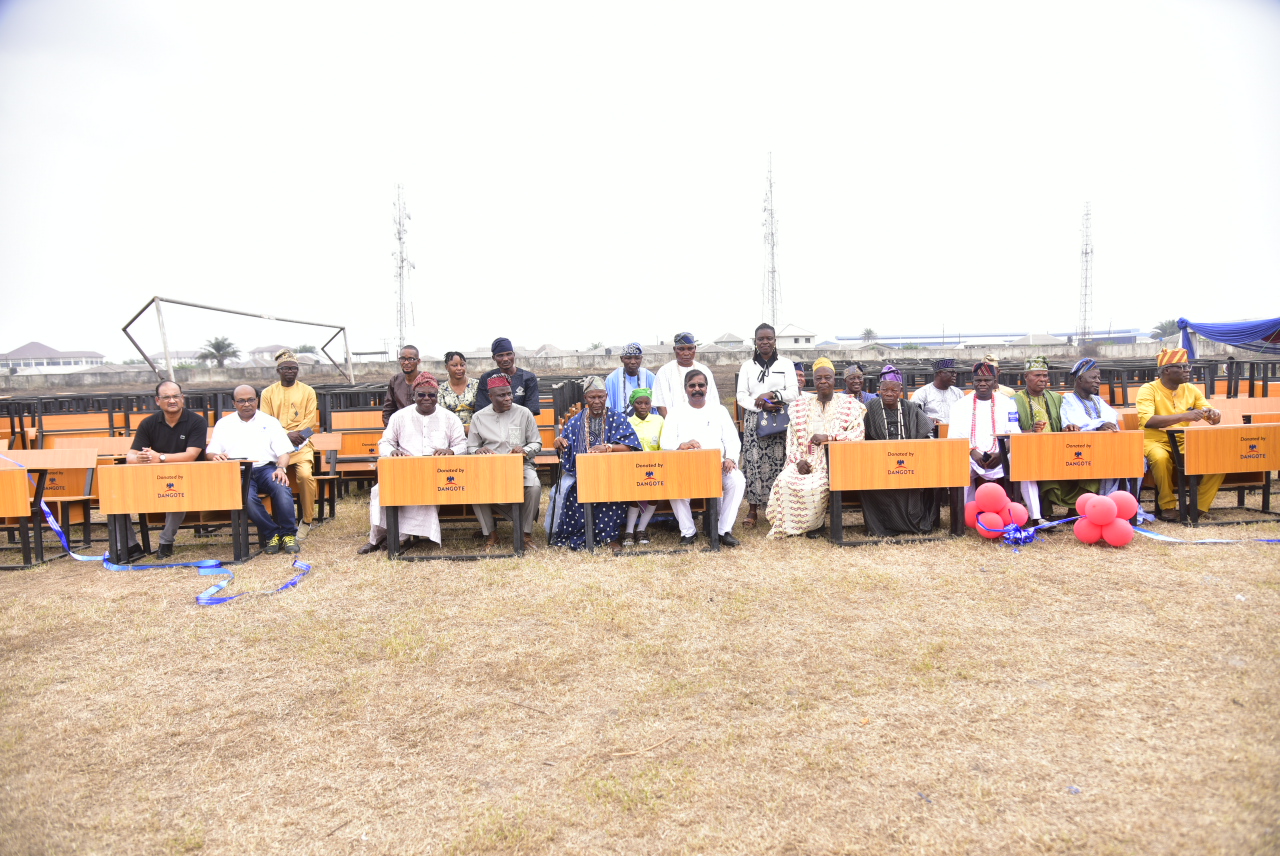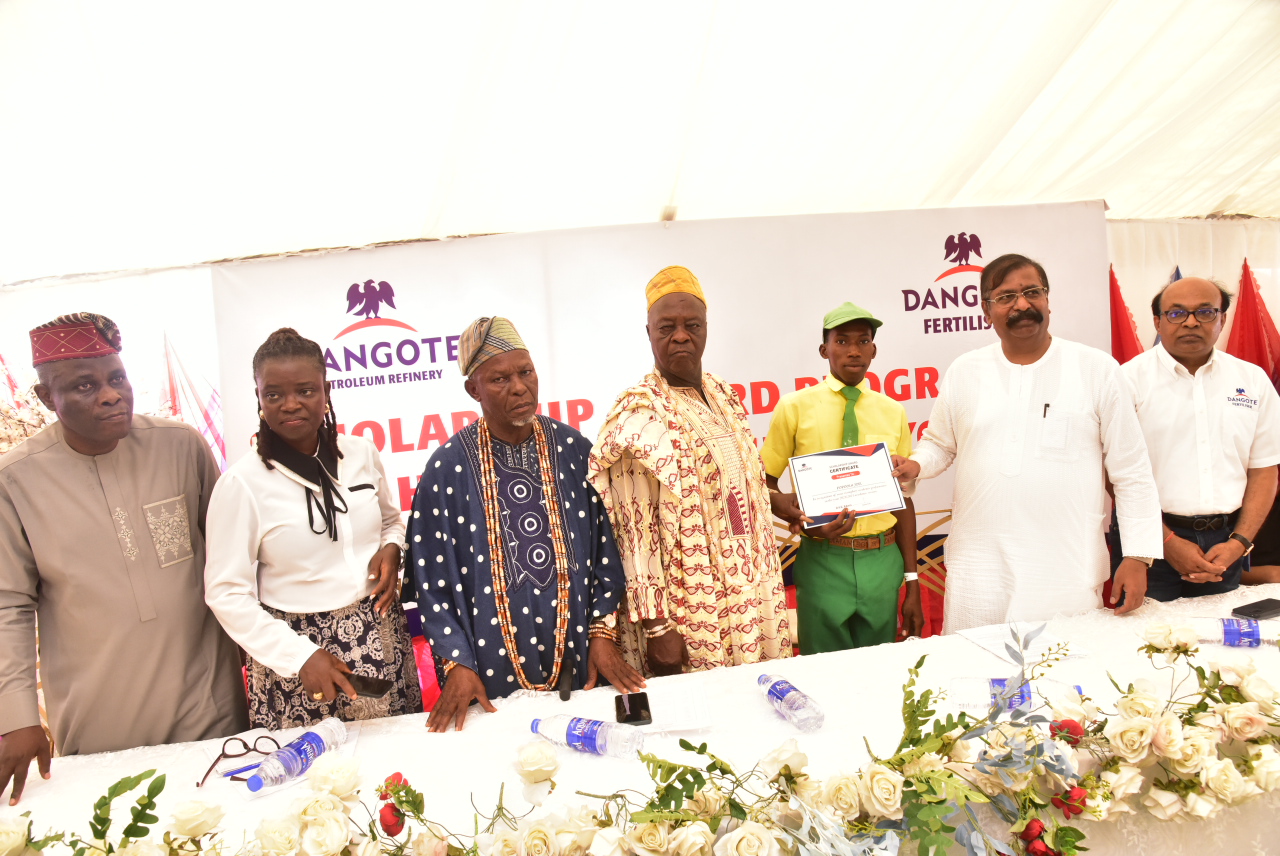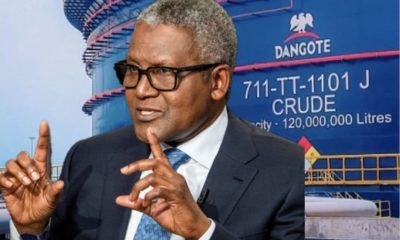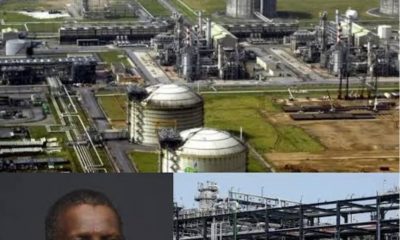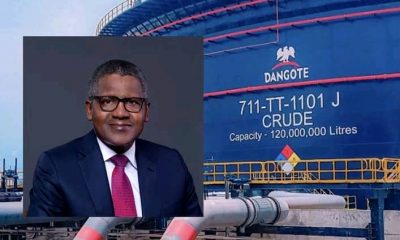Business
Dangote Petroleum Refinery Awards Scholarships to 473 Students

… Donates Furniture, Educational Materials to Host Communities
Joy and elation enveloped the Idotun Community Junior High School, a suburb of Lekki, on Thursday when Dangote Petroleum Refinery & Petrochemicals, in partnership with Dangote Fertilisers Limited, awarded scholarships to 473 students from 10 secondary schools and 7 tertiary institutions. In addition, the company donated eight hundred and four (804) tables and chairs to secondary schools in their host communities of Ibeju-Lekki.
Students, parents, teachers, and community leaders expressed their immense joy as the scholarship certificates were presented to the beneficiaries, alongside educational materials, including textbooks and notebooks, as part of the 5th Edition of the Dangote Scholarship Award Programme.
Group Vice President of Oil & Gas at Dangote Industries Limited, Devakumar Edwin, remarked that the event symbolised a shared vision—a partnership between Dangote Industries and the host communities, designed to build a foundation for sustained growth, one that is rooted in education, innovation, and opportunity.
He further emphasised that the initiative is not merely a celebration of achievements but a reaffirmation of the group’s commitment to nurturing potential, empowering communities, and shaping a brighter future for the leaders of tomorrow.
“Education, as we all know, is the passport to the future. At Dangote, we believe that education is not just a privilege but a right that every child deserves. This belief has fueled our dedication to supporting students and schools in our host communities since the year 2019 when we launched the Scholarship Award Programme as a key pillar of our Community Development Plan, with year-on-year progress,” he said.
Praising the students for their academic dedication, which he acknowledged has resulted in remarkable growth over the years, Mr. Edwin highlighted the impressive year-on-year progress—from 56 students in 2019 to 450 beneficiaries in 2024. He stated that the company is deeply inspired by their determination and is confident that the resources provided will empower them to realise their dreams.
He also noted that the decision to donate the 804 tables and chairs to schools was part of the company’s broader commitment to enhancing the learning environment. This gesture, he emphasised, is a testament to the company’s dedication to ensuring that every child has access to a conducive environment for learning, where they can grow, dream, and thrive.
“To the scholars here today, you are at the heart of our initiatives. Your dreams, aspirations, and hard work inspire us to continue making a difference. As you embark on your academic journeys, remember that the support you receive today is a seed sown in fertile ground. Nurture it with dedication, perseverance, and a spirit of excellence, and it will yield remarkable fruits in your future.
“I would like to extend my heartfelt gratitude to our community leaders, dedicated school administrators who work tirelessly to ensure the success of these initiatives. Your partnership and support are invaluable, and we are honored to work alongside you in empowering the next generation,” he added.
The Managing Director of Dangote Industries Free Zone Development Company (DIFZDC), Olayinka Akande, urged the beneficiaries to uphold excellence, which he identified as one of the core values of Dangote Industries Limited. Emphasising the importance of dedication and diligence, he encouraged the students to aim high, noting that with such attributes, some of them could rise to become governors, ministers, captains of industry, or even the next ‘Edwin’ in the future.
The Head of Social Performance at Dangote Petroleum & Petrochemicals, Ogunleye Mojisola, highlighted that the education intervention is one of the four pillars of the Community Development Plan, which was jointly designed with the community. Reflecting on the scheme’s success since its inception in 2019, Ogunleye expressed gratitude to the management for consistently providing the necessary resources to sustain the programme.
“The increase in the number of beneficiaries each year is a clear indication that the initiative is fulfilling its purpose, motivating students to study hard and achieve academic excellence,” she remarked.
The Aro of Lekki Kingdom, Chief Adewale Salami, who represented the Oni of Lekki, conveyed his appreciation for the intervention, affirming that the company is helping to shape the future of the community. He also expressed the kingdom’s continued support for Dangote Industries Limited.
The Chairman of the Lekki Coastal Area Development Association, Alhaji Wasiu Ayeola, praised the founder and Chief Executive of Dangote Industries Limited, Aliko Dangote, for transforming what was once a hunting ground of rabbits and lizards into a multibillion-dollar investment that benefits not only the local community and Lagos but also Nigeria and the world. He emphasised that education is the most effective way to shape the future of the community.
Several beneficiaries, including Atibere Peter from Lagos State University, Dauda Omolara from Community Senior High School, Magbon Segun, and Ganiu Ayomide from Community Senior High School, Akodo, among others, expressed their heartfelt gratitude. They noted that the scholarship and support would motivate them to study harder and alleviate the financial burden on their parents and guardians.
PHOTO CAPTION
DSC 5901, Vice President, Oil & Gas, Dangote Industries Limited, Devakumar Edwin; Some of the Baales and Dignitaries at handing over of Tables and Chairs Donated to Host Communities secondary schools by Dangote Petroleum Refinery, Petrochemicals and Fertiliser Plant in Lekki, on Thursday 16th January 2025.
DSC 5913; L-R, Alh. Wasiu O Ayeola , Chairman Lekki Coastal Area Development Association, Jaiswal Anurag, Director of Operations Dangote Fertiliser, Chief M. Adewale Salami, Aro of Lekki kingdom, Represent Oni Lekki of Lekki,
Vice President, Oil & Gas, Dangote Industries Limited, Devakumar Edwin; Chief Mufutau Dauda, Baale of Magbon and Chairman of Baale’s in Lekki, Director Clubs and Societies Education District 3, Rep. Of Perm. Secretary, Ajibola – Morebise Olubunmi, at the handing over of Tables and Chairs Donated to Host Communities secondary schools by Dangote Petroleum Refinery, Petrochemicals and Fertiliser Plant in Lekki, 5th Edition of the Dangote Scholarship Awards on Thursday 16th January 2025.
Bank
Alpha Morgan to Host 19th Economic Review Webinar

Alpha Morgan to Host 19th Economic Review Webinar
In an economy shaped by constant shifts, the edge often belongs to those with the right information.
On Wednesday, February 25, 2026, Alpha Morgan Bank will host the 19th edition of its Economic Review Webinar, a high-level thought leadership session designed to equip businesses, investors, and individuals with timely financial and economic insight.
The session, which will hold live on Zoom at 10:00am WAT and will feature economist Bismarck Rewane, who will examine the key signals influencing Nigeria’s economic direction in 2026, including policy trends, market movements, and global developments shaping the local landscape.
With a consistent track record of delivering clarity in uncertain times, the Alpha Morgan Economic Review continues to provide practical context for decision-making in a dynamic environment.
Registration for the 19th Alpha Morgan Economic Review is free and can be completed via https://bit.ly/registeramerseries19
It is a bi-monthly platform that is open to the public and is held virtually.
Visit www.alphamorganbank to know more.
Business
GTBank Launches Quick Airtime Loan at 2.95%

GTBank Launches Quick Airtime Loan at 2.95%
Guaranty Trust Bank Ltd (GTBank), the flagship banking franchise of GTCO Plc, Africa’s leading financial services group, today announced the launch of Quick Airtime Loan, an innovative digital solution that gives customers instant access to airtime when they run out of call credit and have limited funds in their bank accounts, ensuring customers can stay connected when it matters most.
In today’s always-on world, running out of airtime is more than a minor inconvenience. It can mean missed opportunities, disrupted plans, and lost connections, often at the very moment when funds are tight, and options are limited. Quick Airtime Loan was created to solve this problem, offering customers instant access to airtime on credit, directly from their bank. With Quick Airtime Loan, eligible GTBank customers can access from ₦100 and up to ₦10,000 by dialing *737*90#. Available across all major mobile networks in Nigeria, the service will soon expand to include data loans, further strengthening its proposition as a reliable on-demand platform.
For years, the airtime credit market has been dominated by Telcos, where charges for this service are at 15%. GTBank is now changing the narrative by offering a customer-centric, bank-led digital alternative priced at 2.95%. Built on transparency, convenience and affordability, Quick Airtime Loan has the potential to broaden access to airtime, deliver meaningful cost savings for millions of Nigerians, and redefine how financial services show up in everyday life, not just in banking moments.
Commenting on the product launch, Miriam Olusanya, Managing Director of Guaranty Trust Bank Ltd, said: “Quick Airtime Loan reflects GTBank’s continued focus on delivering digital solutions that are relevant, accessible, and built around real customer needs. The solution underscores the power of a connected financial ecosystem, combining GTBank’s digital reach and lending expertise with the capabilities of HabariPay to deliver a smooth, end-to-end experience. By leveraging unique strengths across the Group, we are able to accelerate innovation, strengthen execution, and deliver a more integrated customer experience across all our service channels.”
Importantly, Quick Airtime Loan highlights GTCO’s evolution as a fully diversified financial services group. Leveraging HabariPay’s Squad, the solution reinforces the Group’s ecosystem proposition by bringing together banking, payment technology, and digital channels to deliver intuitive, one-stop experiences for customers.
With this new product launch, Guaranty Trust Bank is extending its legacy of pioneering digital-first solutions that have redefined customer access to financial services across the industry, building on the proven strength of its widely adopted QuickCredit offering and the convenience of the Bank’s iconic *737# USSD Banking platform.
About Guaranty Trust Bank
Guaranty Trust Bank (GTBank) is the flagship banking franchise of GTCO Plc, a leading financial services group with a strong presence across Africa and the United Kingdom. The Bank is widely recognized for its leadership in digital banking, customer experience, and innovative financial solutions that deliver value to individuals, businesses, and communities.
About HabariPay
HabariPay is the payments fintech subsidiary of GTCO Plc, focused on enabling fast, secure, and accessible digital payments for individuals and businesses. By integrating payments and digital technology, HabariPay supports innovative services that make everyday financial interactions simpler and more seamless.
Enquiries:
GTCO
Group Corporate Communication
[email protected]
+234-1-2715227
www.gtcoplc.com
Business
BUA Group, AD Ports Group and MAIR Group Launch Strategic Plan for World-Class Sugar and Agro-Logistics Hub at Khalifa Port
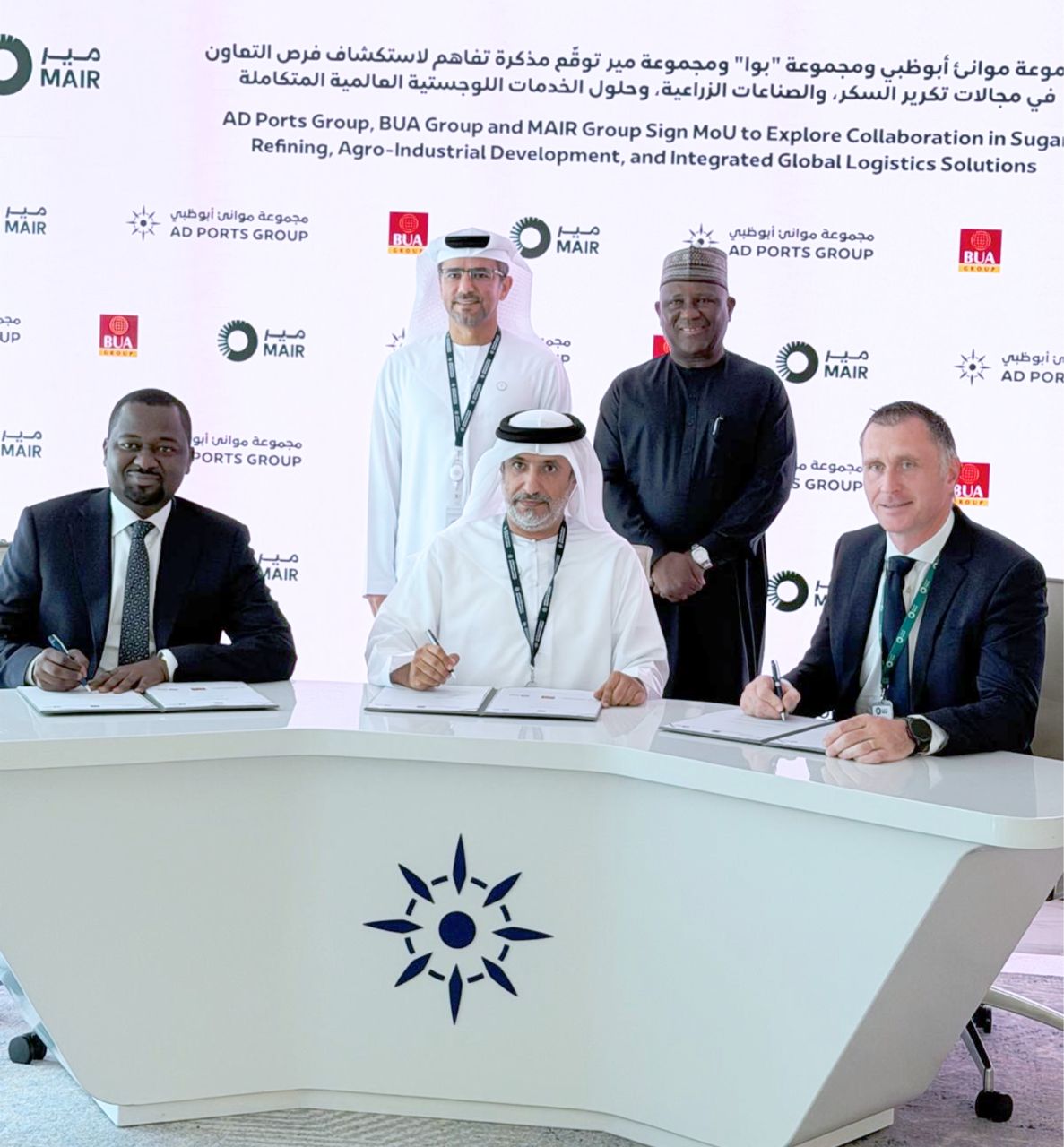
BUA Group, AD Ports Group and MAIR Group Sign MoU to Explore Collaboration in Sugar Refining, Agro-Industrial Development, and Integrated Global Logistics Solutions
Abu Dhabi, UAE – Monday, 16th February 2026
BUA Group, AD Ports Group, and MAIR Group of Abu Dhabi today signed a strategic Memorandum of Understanding (MoU) to explore collaboration in sugar refining, agro-industrial development, and integrated global logistics solutions. The partnership aims to create a world-class platform that strengthens regional food security, supports industrial diversification, and reinforces Abu Dhabi’s position as a hub for trade and manufacturing.
The proposed collaboration will leverage BUA Group’s industrial and logistics expertise, Khalifa Port’s world-class infrastructure, and AD Ports Group’s operational experience. The initiative aligns with the objectives of the UAE Food Security Strategy 2051, which seeks to position the UAE as a global leader in sustainable food production and resilient supply chains. It also aligns with Nigeria’s food production- and export-oriented agricultural transformation agenda, focused on scaling domestic capacity, strengthening value addition, improving post-harvest logistics, and unlocking new markets for Nigerian produce across the Middle East, Asia, and beyond.

Photo Caption: L-R: Kabiru Rabiu, Group Executive Director, BUA Group; Cpt. Mohammed J. Al Shamisi, MD/Group CEO, AD Ports Group; Saif Al Mazrouei, CEO (Ports Cluster) AD Ports Group; Abdul Samad Rabiu, Founder/Executive Chairman, BUA Group; and Steve Green, Group CFO, MAIR Group
Through structured aggregation, processing, storage, and maritime export channels, the partnership is designed to reduce supply chain inefficiencies, enhance traceability and quality standards, and also create a predictable trade corridor between West Africa and the Gulf.
BUA Group—recognised as one of Africa’s largest and most diversified conglomerates, with major investments across sugar refining, food production, flour milling, cement manufacturing, and infrastructure- brings extensive industrial expertise and large-scale operational capability to the venture. MAIR Group will provide strategic support in developing integrated logistics and agro-industrial solutions, creating a seamless platform for production, storage, and distribution.
Abdul Samad Rabiu, Founder and Chairman of BUA Group, said:
“This MoU marks an important milestone in BUA’s international expansion and reflects our long-term vision of building globally competitive industrial platforms. Together with AD Ports Group and MAIR Group, we aim to develop sustainable food production and logistics solutions that strengthen regional supply chains and support the UAE’s Food Security Strategy 2051.”
He further added that, “This partnership represents not just a commercial arrangement but a strategic food corridor anchored on shared economic ambition, resilient infrastructure, and disciplined execution, reinforcing long-term food security objectives for both nations.”
A representative of MAIR Group added:
“This collaboration underscores our commitment to advancing strategic industries in Abu Dhabi and building integrated solutions that reinforce the UAE’s position as a global hub for trade, food security, and industrial excellence.”
A spokesperson from AD Ports Group commented:
“Our partnership with BUA Group and MAIR Group highlights Khalifa Port’s role as a catalyst for high-impact industrial investments. This initiative will enhance regional food security, strengthen global trade connectivity, and support Abu Dhabi’s economic diversification goals.”
This MoU marks a historic collaboration that combines world-class infrastructure, industrial expertise, and strategic vision, setting the stage for a sustainable and resilient food and logistics ecosystem that will benefit the UAE, the region, and global markets alike.
-

 celebrity radar - gossips6 months ago
celebrity radar - gossips6 months agoWhy Babangida’s Hilltop Home Became Nigeria’s Political “Mecca”
-

 society6 months ago
society6 months agoPower is a Loan, Not a Possession: The Sacred Duty of Planting People
-

 society5 months ago
society5 months agoReligion: Africa’s Oldest Weapon of Enslavement and the Forgotten Truth
-

 news6 months ago
news6 months agoTHE APPOINTMENT OF WASIU AYINDE BY THE FEDERAL GOVERNMENT AS AN AMBASSADOR SOUNDS EMBARRASSING

